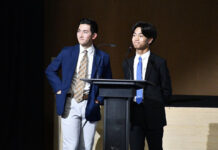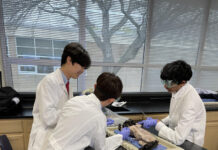Upon arriving at the Plano Presbyterian Hospital on September 23, 2011, members of the Medical Society were anxious about what they would encounter that day. The Medical Society, one of Jesuit’s most extracurricular organizations, sponsors a unique program that allows juniors to shadow doctors at one Dallas or Plano area hospital.
Jesuit’s Dallas shadowers, unfortunately, were not able to go last week due to a scheduling conflict, but Plano students were released early from school to begin shadowing at one in the afternoon. Each of the students went to a different field or area of the hospital that they were allowed to see. These included: bariatrics, the catheterization laboratory, the emergency room(ER), the house supervisor, the intensive care unit (ICU), medical surgery, the neonatal intensive care unit, oncology, orthopedics, pediatrics, physical therapy, radiology, telemetry, and internal telemetry. The Medical Society sent sixteen of their juniors to these various areas of study, and all of them gained something out of this experience.
Bariatrics is the field of medicine that deals with the study, care, and prevention of obesity, a condition that is prevalent in the United States today. Davis Bittner ’13, who went to the bariatrics shadowing on Friday, commented that he “enjoyed it because I got to watch nurses interact and help with patients, which was really interesting and was my favorite part.” Although he enjoyed his time at bariatrics, like most students he is looking forward to the ER.
Carson Buell ’13 went to the catheterization, or “cath” laboratory, where all the patient x-rays are taken. He noted that he “enjoyed how friendly of an environment it was; all of the doctors and nurses were very humble and friendly.” JD Feist ’13 visited Plano Presbyterian’s highly acclaimed ICU, a place where patients who need constant medical attention reside. He was fortunate enough to see an endoscopy, a procedure in which a microscope is sent into the body to find problems or to see if everything is running smoothly.
Although he was not able to see something as interesting as an endoscope, Caleb Kunasek ’13 was enthused with pediatrics, which is the study of disease on children, saying “I went to Pediatrics and it was a great experience because you get to see the life of a nurse, how busy they are, and how hard they work to help keep the hospital running. My favorite part was following the nurses and seeing all the patients.”
Grant Van Kirk, ’13, and Daniel Valencia, ’13, both went to the telemetry portion of the hospital, which is where the nurses and doctors record the rhythms of patients with abnormal or weak heartbeats. Van Kirk remembers “enjoying observing the patients, because it was interesting to learn about heart problems,” and Daniel felt “it was pretty cool learning what all the nurses put into the computer and what everything meant.”
Last, Dylan Clancy ’13, who worked in the ER, had a moment at which he was able to give back to the community that welcomed him. Clancy wheeled an old man who had a fractured finger and Parkinson’s disease to the hospital doors. When his ride arrived, the man thanked Clancy for his work with the hospital
My experience was a little bit different from the other shadowers at Plano Presbyterian hospital last Friday. I went to the oncology department, which is the department that deals with the treatment of cancer. I knew full well going into the day that it was going to be depressing.
When I went to oncology, I was surprised to find that the doctor I was assigned to follow was pulled that day to go treat a patient in Arlington. Luckily, the staff there had plenty for me to do, showing me all the rooms and a few of the interesting machines they use before taking me to a patient’s room. A cancer-stricken woman lay in the bed before me, thin, weak, and with most of her hair gone.
It was eye opening to the fact that this affliction could easily strike me or anyone else. The woman would later go on to say that she felt like she was getting worse, and that the medicine was not working. She and her husband would have celebrated their anniversary this month, but he died in the first week on September.
I left the room when the nurse finished taking the woman’s blood. I later asked this nurse what she wanted to specialize in and she said children’s oncology. To me, this seemed downright crazy after hearing what that elderly woman had to say. So I inquired why on earth she would want to do this, to which she responded that a lot of people want to take the easy jobs where nothing too bad ever happens; she wanted to be the person who helps people get through the truly tough times.
I hope the best for this admirable young woman and all the staff at Plano Presbyterian.






